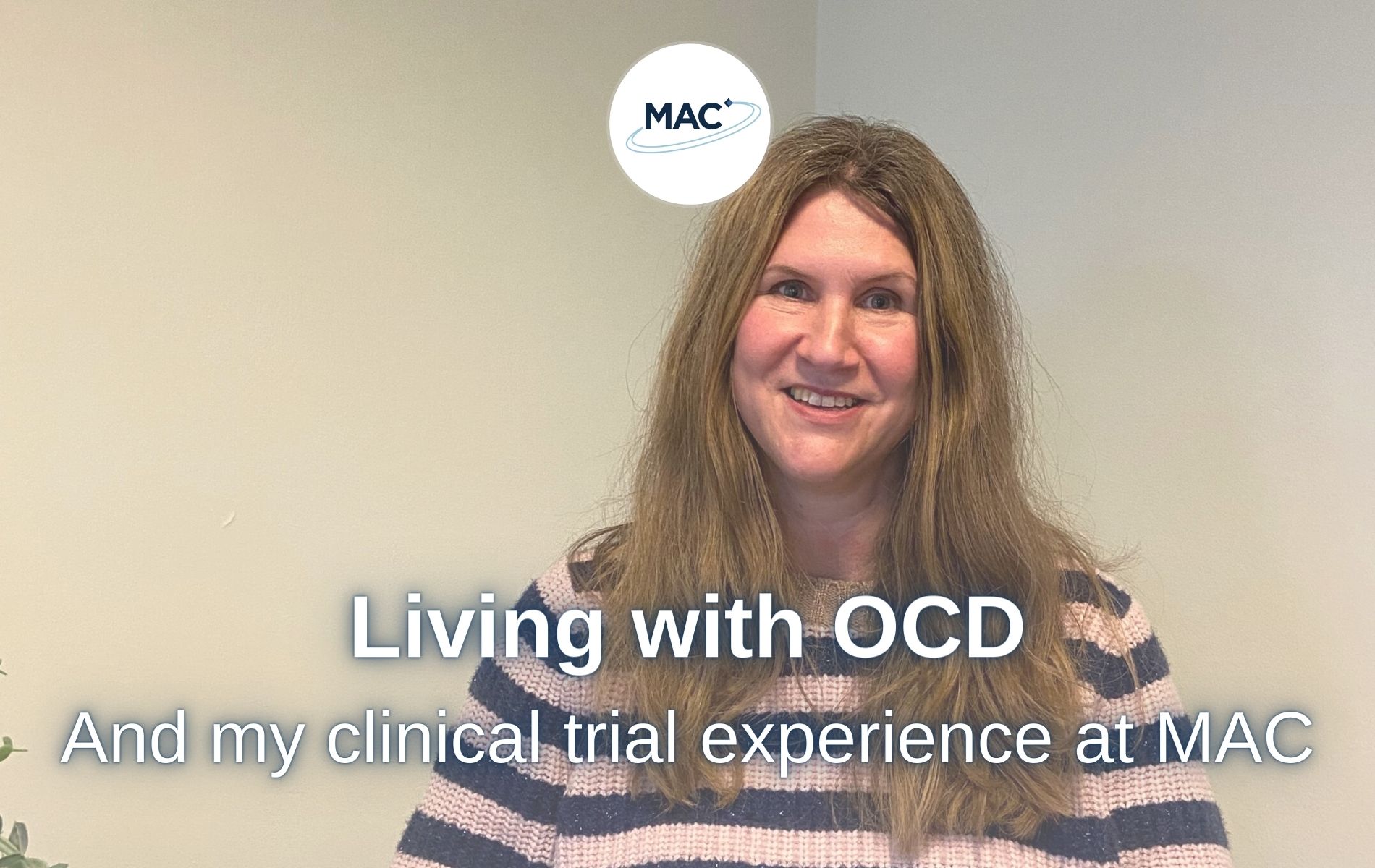Sara has been living with Obsessive Compulsive Disorder since she was 12 years old and recently took part in a clinical trial at MAC Clinical Research, testing a potential new OCD medication.
Obsessive Compulsive Disorder (OCD) is a mental health condition where someone has obsessive thoughts that cause compulsive behaviour. Although Sara has been living with OCD since a teenager, she was not formally diagnosed until she was 30 years old following a bad flare-up of her symptoms. Growing up in the 1980s, she said that it was tough living with OCD: “I thought I was going mad when it happened. I tried to tell my parents; my mum just didn’t understand what it was, and then I started seeing psychologists; my mum sent me to a psychologist because she thought it was normal for a teenager and things were a bit turbulent.
“I don’t think anyone picked up on what it was until I myself diagnosed it pretty much. I had to tell therapists what I thought it was – some of them agreed, some of them didn’t agree – so I felt like the knowledge just wasn’t there.” Whilst awareness and knowledge of mental health conditions such as OCD have improved since Sara’s first diagnosis many years ago, there is still a need for further research and improved treatment options for those living with OCD.
Sara says one of the main challenges that comes with living with OCD is being present when a recurring thought can come into her head. She said it can be hard to enjoy life and “to do things other people take for granted because sometimes it’s actually quite subtle; your mind is stuck in a loop, even if you can be really good at hiding it – it looks like you’re there, but you don’t feel like you’re there, so it feels like you’re losing time.”
Sara works as a freelance translator, translating her mother-tongue Swedish into English, and says that OCD has impacted her work life as well as her family life. She said: “A lot of people with OCD end up not working and not having families so I guess I have been lucky to be able to do some of these things. My career is probably not where it would have been if I didn’t live with OCD. It’s a kind of grief that you have”.
“I do think there’s more understanding [of OCD] in the workplace, for example, but I don’t think that was always the case. Just the fact that you’re not as efficient and I was someone who was bogged down in a lot of internal rituals in my head, and it just makes you slower.”
This was not the first clinical trial Sara had participated in, but this was her first for OCD as she wanted to see if there were any new treatments that could help her. She said “I was a little nervous before taking part in this one but I was just happy to try something new.
“I wasn’t in a really bad place, but I hadn’t been fully helped by treatments that were available. So, I just thought I’ll definitely give it a go. I wanted to help – I think there needs to be better treatments available. I was so happy when I found this trial, really, really happy. It made me quite hopeful”.
Sara lives in the South West of the UK so travelled to MAC’s clinic in Cannock to attend her visits as part of the study, but had no problem getting to and from the site. She said: “MAC have been brilliant in accommodating visits. Once there was a train strike and they booked a cab for my whole journey. Things have always been sorted out and there have been no issues.”
She encourages others to register for MAC’s clinical trial if they are going through a similar experience [with OCD]. She said: “I think people should not hesitate if they’re suffering. If you know that you haven’t been fully helped by what’s out there and it’s not always easy – OCD can become part of who you are – but don’t accept and settle for that. Try something new, try something different.”
MAC Clinical Research is still looking for participants to take part in the latest OCD clinical trial, investigating a medication that is thought to target a different signalling pathway in the brain to current OCD treatments, which may help to control obsessive or compulsive behaviours. With your participation, you may be able to contribute to scientific research which may lead to a new medicine to help people living with OCD.
The study is running at MAC clinics in Lancashire, Greater Manchester, Merseyside, South Staffordshire, South Yorkshire, Teesside, and West Yorkshire.
To be eligible, you must: be between 18 and 65 years old; have had OCD, or OCD symptoms for at least 1 year; and feel that your current medication is not fully working. Eligible participants will receive up to £490 for their time and commitment to the study, along with reasonable travel costs. If the treatment works you may be allowed to continue taking it (open label extension) for up to 48 weeks.
For more information on how you can get involved, visit our OCD Research page.




